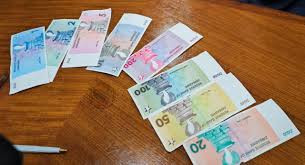
FOLLOWING the introduction of a new currency in Zimbabwe, the Zimbabwe Gold (ZiG), which replaced the ZWL on April 5 2024, the Central Bank then tightened the monetary policy in a bid to achieve exchange rate stability.
Subsequently, the stock markets in the country have succumbed to sell-offs since then, while the currency indeed continues to register a positive trajectory. Assessing the relationship between these two fundamentals is imperative for prospective financial markets investors.
ZiG, backed by a basket of foreign currencies, gold, and other precious metals, replaced the ZWL (Zimbabwe dollar) in an effort to address decades of economic turmoil.
Consequently, the Zimbabwe Stock Exchange (ZSE) changed its functional currency to ZiG, and rebased all indices to 100 on April 8 in a bid to effectively reflect the effect of the new currency on financial markets. Likewise, all share prices were also converted to ZiG at a rate of 2,498.65 upon introduction.
Since the rebasing of indices, the mainstream ZSE All Share Index had dipped -3,7% as of Monday, April 22, in nominal terms. In USD terms, the All Share Index was down only -1,8%, based on the official exchange rate.
However, based on the parallel market valuation, the ZSE All Share Index has dipped by a staggering -27% in USD terms. These two different valuations pose a threat to actual value preservation on the bourse, as the argument centres on which between the two currency markets is more reflective of real day-to-day market dynamics.
As aforementioned, the new structured currency is mainly backed by gold reserves, and thus its value on the official currency market is derived from gold price movements, although the governor officially hinted that the Central Bank will, overtime, factor in the effect of inflation in determining a realistic exchange rate.
Nevertheless, the value determination methodology has seen the ZiG appreciate in value against the United States dollar (USD) consistently on a daily basis since inception.
- ‘Inflation could shoot to 700% by April next year’
- New perspectives: Inflation control critical for economic growth
- Inflation spike: Why interest rates aren’t the answer
- Village Rhapsody: Govt must ensure that devolution works
Keep Reading
As at April 22, the ZiG had gained 2,1% from ZiG13,57 to ZiG13,29 for every US$1 on the interbank market. However, the parallel currency market has remained viable even in the face of a new currency, due to various leverage that mainly include the demand for USD for importation by informal traders as well as for value preservation.
Consequently, the ZiG has depreciation by a circa -25% on the parallel market.
The parallel market has the leverage of ease of trade, as anyone can easily buy or sell their foreign currency in real time with less or none stringent considerations. This is the opposite with formal banks, hence the parallel market reflects more of supply and demand forces than do the interbank market. In this light, the parallel market is considered a more realistic base for valuation even by formal market players.
Due to constrained liquidity, the ZSE is likely going to continue diving, with sell-offs heightening as investors seek liquidity. Additionally, the uncertainties around the new currency have also weighed on investor sentiment. Nevertheless, while the ZiG appears to be appreciating on the interbank market, the ZSE is not well positioned to preserve value in the short-term for avid investors.
The contractionary monetary policy means reduced demand and activity in the economy, and this translates to reduced trades on the ZSE in the short-term.
Meanwhile, despite a changed currency, Zimbabwe maintained its status quo, with particular sectors being forced to accept local currency while other key sectors are excluded from enforcements. Due to this reality, the parallel market will continue to thrive even amid threats from the government.
This entails a rapid diverging trajectory between exchange rate and share prices, as inflation soars while stock prices tumble on ZSE.
- Duma is a financial analyst and accountant at Equity Axis, a leading media and financial research firm in Zimbabwe. — twdumah@gmail.com or tinashed@equityaxis.com, X: TWDuma_






